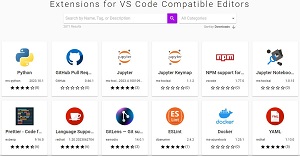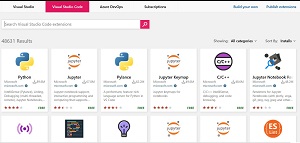News
Open Source Alternative to Visual Studio Marketplace Avoids Decommission
Open source champion Eclipse Foundation is advancing the Open VSX Registry, a vendor-neutral, community-supported alternative to the Microsoft Visual Studio Marketplace.
However, while Microsoft's Visual Studio Marketplace is divided into sections for the full-blown Visual Studio IDE and its little cousin, the open source-based Visual Studio Code editor, the Open VSX Registry is compatible only with the latter.
The Eclipse Foundation today announced the formation of the Open VSX Working Group with the mission of managing and accelerating adoption of the Open VSX Registry, an offering in the works since 2020 that currently has more than 2,800 tools for VS Code from more than 1,500 different publishers. The open source alternative has some work to do, though, as the VS Code Marketplace boasts more than 48,000 items.
In comparing the following screenshots of the Eclipse Foundation and Microsoft marketplace offering, this news is probably going to be of most interest to Python coders.
 [Click on image for larger view.] Open VSX Registry (source: Eclipse Foundation).
[Click on image for larger view.] Open VSX Registry (source: Eclipse Foundation).
 [Click on image for larger view.] Visual Studio Code Marketplace (source: Microsoft).
[Click on image for larger view.] Visual Studio Code Marketplace (source: Microsoft).
A primary selling point is that in contrast to the VS Code Marketplace, the Open VSX Registry offers free access to extensions that can be used with any technology or tool that supports them. Built on the Eclipse Open VSX open source project, it has seen developers consume more than 40 million extensions since 2021, with downloads reportedly now exceeding 2 million per month.
That project's site details what it's all about:
Eclipse Open VSX is a vendor-neutral open-source alternative to the Visual Studio Marketplace. It provides a server application that manages VS Code extensions in a database, a web application similar to the VS Marketplace, and a command-line tool for publishing extensions. A public instance of the Registry is hosted by the Eclipse Foundation, but more instances can be freely deployed in public or private places.
The primary purpose of this project is to provide a marketplace for VS Code extensions that can be used with Eclipse Theia and other IDEs. Another important goal is to allow self-hosting the Registry, e.g. within a company network. None of this is currently possible with the VS Marketplace, which is proprietary and may be accessed only from Visual Studio products.
Along with Theia, other development tooling wares that support Open VSX Registry extensions include Salesforce Code Builder, Google Cloud Workstations, Gitpod, SAP Business Application Studio and other applications based on Eclipse projects.
The Open VSX Registry effort was initially spearheaded by the company TypeFox, but its new working group includes Google, Huawei, Posit, Salesforce, Siemens and STMicroelectronics.
The Eclipse Foundation in February warned that unless a new, sustainable funding and governance model was found for the Open-vsx.org project, it would be decommissioned by the end of May. Today's announcement indicates that salvage effort has paid off.
"The Open VSX Registry has experienced significant momentum at the Eclipse Foundation, so much so that it merits having its own working group for continued evolution and growth," said Mike Milinkovich, executive director of the Foundation. "By creating a vendor-neutral home with a true open source model for these extensions, we can ensure that this marketplace is guided by the community, and not just a single vendor."
More information can be found in the Eclipse Open VSX GitHub repo, while community discussion can be found on Gitter. There is also a FAQ and more wiki documentation.
About the Author
David Ramel is an editor and writer at Converge 360.